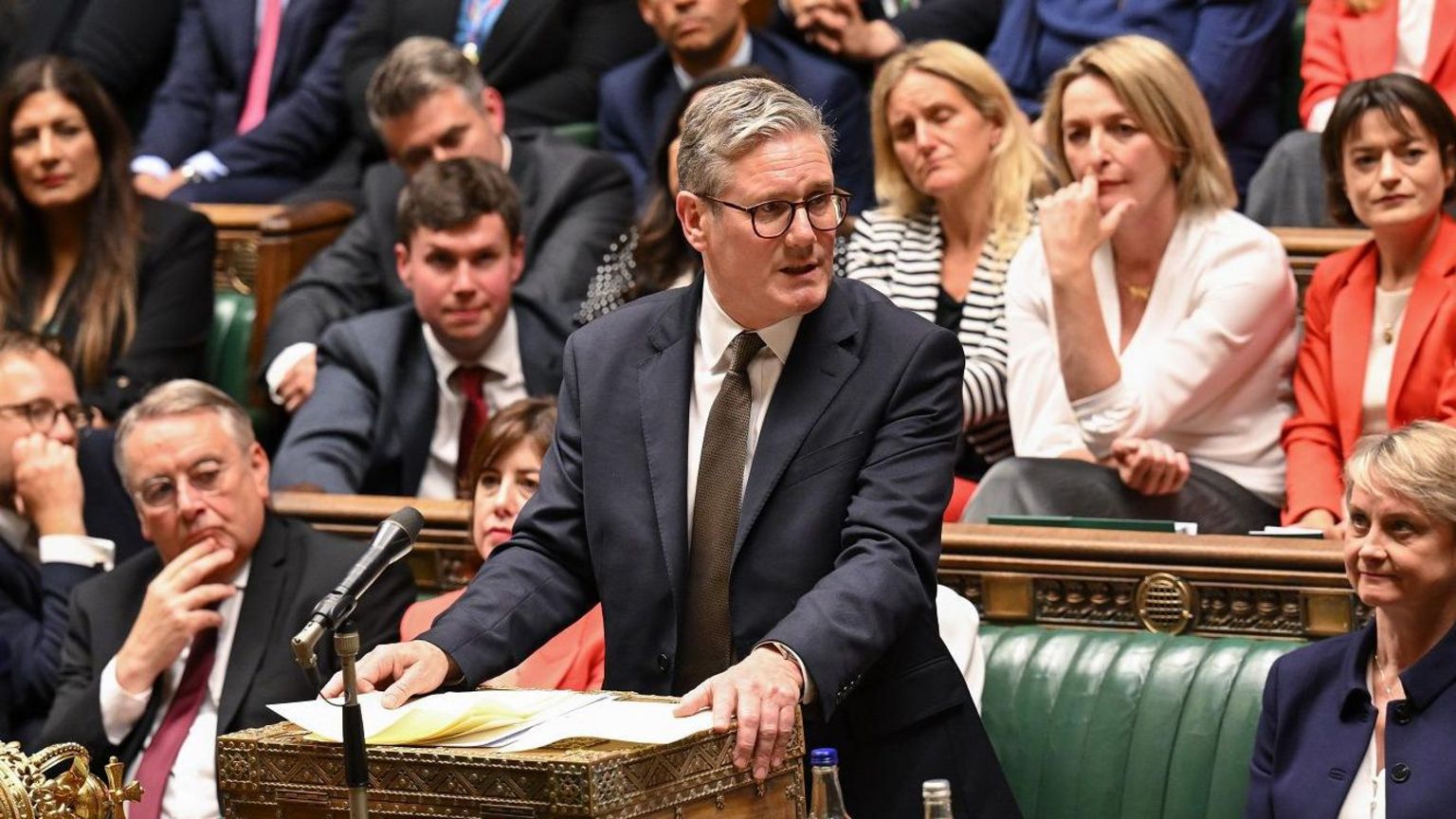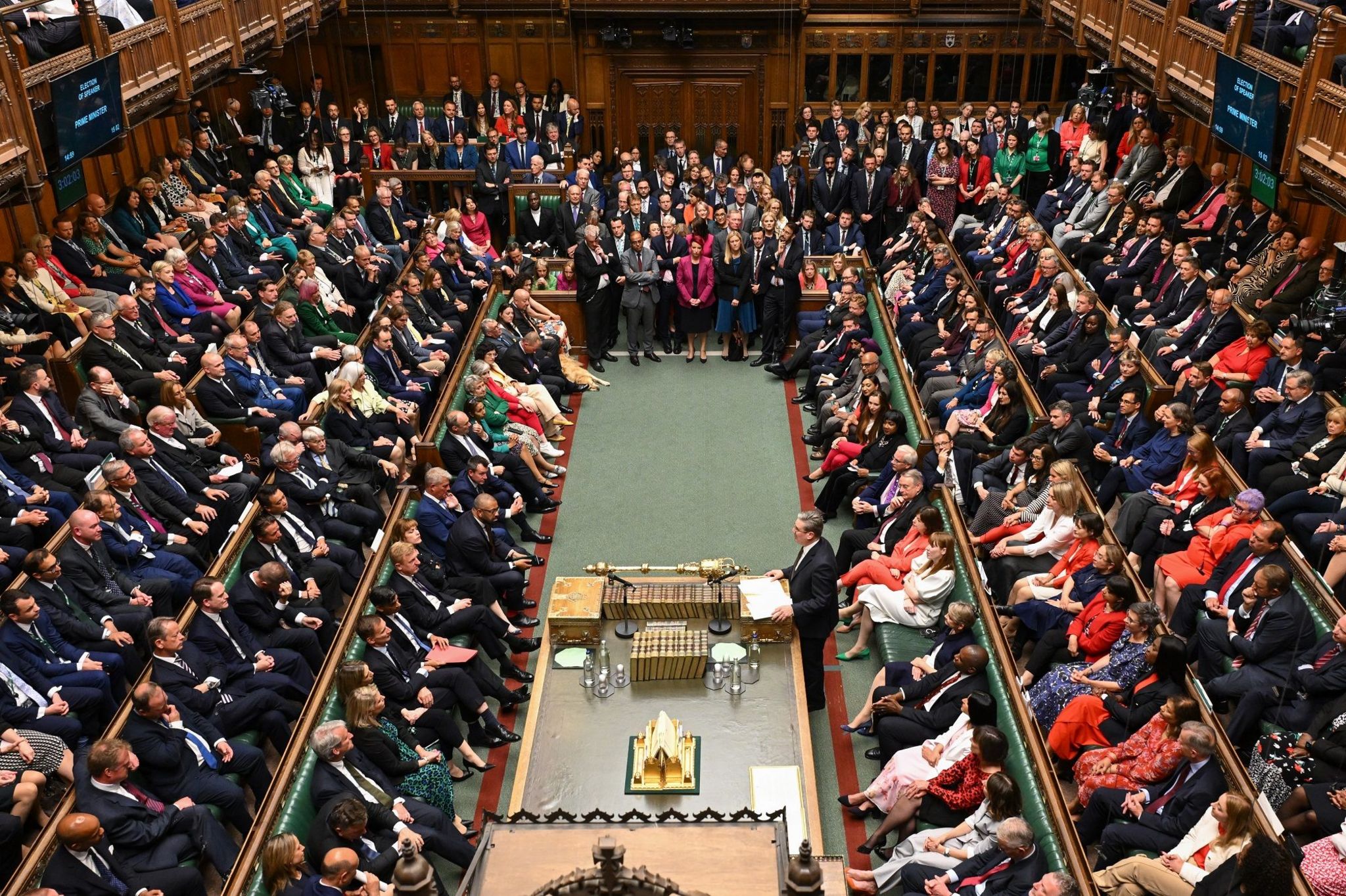Starmer proud of ‘most diverse’ Parliament ever

Sir Keir Starmer has praised the new Parliament as the most diverse in terms of race and gender “this country has ever seen” in his first speech to the Commons as prime minister.
He vowed to “put an end to a politics that has too often seemed self-serving” and replace it with “the politics of service”.
Other party leaders also gave speeches ahead of the swearing in of MPs.
Rishi Sunak repeated his apology to Conservative MPs who were not re-elected last week and pledged to take up the role of opposition “professionally, effectively, and humbly”.
-
Who are Westminster’s newbie MPs?
-
1 day ago
-
-
‘First day at school vibes’ as new MPs start work
-
1 day ago
-
Labour’s landslide victory saw the party take 412 seats, with the Conservatives falling to 121 – their lowest number in history.
Out of the 650 people elected last Thursday, 335 have never been an MP before.
The large number of new Labour MPs meant the government side of the Commons was crammed full, with at least 60 Labour MPs left standing.
Sir Keir was greeted by a standing ovation from the Labour benches as he arrived in the Commons, and briefly spoke to his predecessor Mr Sunak before the pair took their seats.
For the first time in parliamentary history, the proportion of women elected is more than 40%.
Meanwhile, the proportion of MPs from ethnic-minority backgrounds is now a record 14%.
Sir Keir told the Commons he was “proud” of the part Labour had played in improving the diversity of Parliament, adding that the new intake also had the largest cohort of LGBT+ MPs of any parliament in the world.
In his speech, he also paid tribute to Diane Abbott, the new Mother of the House – a title given to the longest continuously serving female MP.
The PM said Ms Abbott had “done so much in her career over so many years to fight for a Parliament that truly represents modern Britain”.
At the beginning of the campaign the veteran left-winger, who was the first female black MP when she was elected in 1987, faced uncertainty over whether she would be re-selected as Labour’s candidate for Hackney North and Stoke Newington.
She was suspended from Labour last year over comments about racism and claimed she had been blocked from standing for the party.
However, she was readmitted at the end of May and Sir Keir later said she was free to go forward as Labour’s candidate.
Mr Sunak, who has promised to stay on as Conservative leader until arrangements for choosing his successor are in place, also paid tribute to Ms Abbott as “a trailblazer” and “inspiration for so many young women of colour”.

In his own speech, Liberal Democrat leader Sir Ed Davey, whose party is now the third largest in the Commons with 72 MPs, vowed to hold the government to account, focusing on issues including health, social care, sewage and the cost of living.
In a reference to the number of SNP MPs falling from 48 to nine, the party’s Westminster leader Stephen Flynn said: “There’s probably a few more new members from Scottish constituencies than I would like to have seen, but I do look forward to working constructively with you to deliver in the best interests of the people that we are all so fortunate to represent.”
Along with other parties, he paid tribute to Sir Lindsay Hoyle, who was re-elected unopposed to the position of Speaker, who presides over Commons debates and upholds parliamentary rules.
The pair previously clashed over Sir Lindsay’s decision not to allow a vote on an SNP call for an immediate ceasefire in the Gaza conflict.
Sir Lindsay continued in his role despite pressure to stand down over the issue, with a motion of no confidence attracting more than 80 signatures.
Mr Flynn told the Speaker: “I think it’s safe to say that me and you didn’t always see eye to eye during the course of the last parliament but in politics and in life, I think it’s important to let bygones be bygones and to focus on the future.”
Sir Lindsay said he would continue to be “fair, impartial and independent” in the role.
After his re-election was approved by MPs, he was dragged to the Speaker’s chair by Labour MP Cat Smith and Tory Sir David Davis.
The dragging of the Speaker is a traditional part of the process in which the successful candidate pretends to be reluctant to take up the role and is physically escorted by MPs.
This video can not be played
To play this video you need to enable JavaScript in your browser.
Reform UK leader Nigel Farage used his speech to take a swipe at Sir Lindsay’s predecessor as speaker John Bercow.
To groans from some, he said Sir Lindsay was “in marked contrast to the little man that was there before you and besmirched the office so dreadfully in doing his best to overturn the biggest democratic result in the history of the country” – a reference to some of the controversial decisions Mr Bercow made on Brexit votes in Parliament.
Mr Farage, who was elected to Parliament on his eighth attempt, hailed his party as “the new kids on the block”, after Reform won five seats.
DUP leader Gavin Robinson, Plaid Cymru Westminster Leader Liz Savile Roberts, Green co-leader Adrian Ramsay, SDLP Westminster leader Colum Eastwood, Alliance MP Sorcha Eastwood and TUV leader Jim Allistair also gave speeches.
MPs are now beginning the process of being sworn in, where they make an oath or affirmation of allegiance to the Crown.

-
LIVE: Follow all the latest general election results news
-
Who’s in Keir Starmer’s new cabinet?
-
Laura Kuenssberg: Inside Keir Starmer’s preparations for power
-
Who is my MP now? The election in maps and charts
-
General election 2024: All BBC stories and analysis
Related Topics
- Keir Starmer
- UK Parliament
- General election 2024
Published at Tue, 09 Jul 2024 18:06:59 +0000
